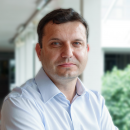Seminars
Info about the subject
Information on the course
Next lecture: Introduction
Schedule

Final grading
A written test (30 %)
A presentation of a topic concerning materials engineering (30 %)
Laboratory reports (40 %)
Tests
There will be two written tests at the end of the term (in December).
1. One test (about 15 min) is for credit assessment, and it will contain questions concerning lab exercises.
2. The other test (about 30 min) is a 30 % part of the final grading (see above), and it will contain questions concerning topics from lectures.
Presentations
Each presentation should be 5-6 minutes, prepare about 8-10 pages in PowerPoint.
Bring your ppt file (or pdf file) on a USB flash drive.
Choose any topic on materials engineering which you like.
Your presentations will be graded - they form 30% of the final grade (see above).
Lectures
Lectures are not mandatory.
- Basic properties of materials: bulk density, matrix density, relative density, porosity, gravimetric and pycnometric methods, gas adsorption porosimetry and mercury intrusion porosimetry
- Moisture transport: water vapor diffusion, liquid moisture transport, water suction measurement, Fick's Law, diffusion equation
- Bolztmann-Matano method: the basic idea, formula for a diffusion coefficient, example for the moisture diffusivity in a porous concrete
- Thermal properties of materials: heat, temperature, internal energy, entropy, work, heat capacity
- Heat conduction 1: Fourier's Law, thermal conductivity, equation of heat conduction, thermal diffusivity
- Heat conduction 2: Example of 1D heat conduction, separation of variables, analytical solution via an infinite series
- Other lectures will be listed later.
Laboratory exercises
Be aware that only one absence in laboratory exercises is allowed.
1. Introductory exercise – work safety, basic rules of laboratory work safety, standard laboratory protocol, visiting of laboratories.
Presentation: Introduction
2. Basic properties of porous building materials - experimental determination of bulk density, matrix density, vacuum saturation moisture content, total open porosity – gravimetric method, vacuum saturation method, pycnometric method.
For further information see: basic-material-properties
3. Water vapor transport - cup method (wet/dry), measurement of water vapor diffusion coefficient and water vapor resistance factor.
+ Liquid moisture transport - experimental determination of water absorption coefficient and apparent moisture diffusivity
For further information see: moisture-transport-1
4. Thermal properties of building materials – assessment of thermal conductivity, specific heat capacity, thermal diffusivity for dry materials as well as in dependence on moisture content rising
For further information see: thermal-energy-transmission
5. Dynamic viscosity of fluid, newtonian fluid, non-newtonian fluid, Stokes law, measurement of viscosity of chosen liquids.
+ Working with microscope - samples preparation, texture of building materials
For further information see: dynamic-viscosity-of-fluid-working-with-microscope


